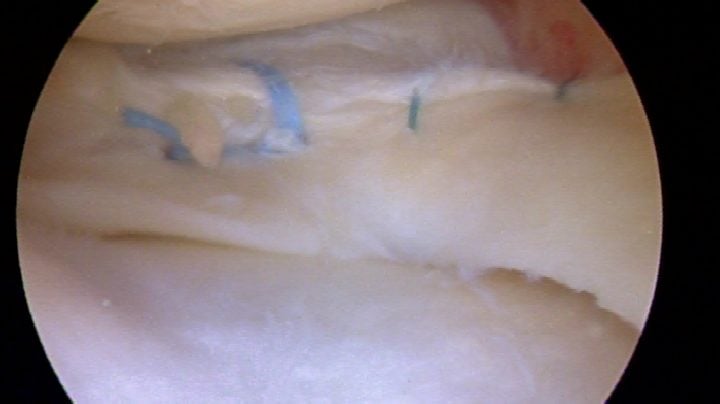
Meniscus tears are a very common injury. Since many people over 50 will have one and many more over 70 will have one it is normal to wonder if a meniscus tear can heal without surgery.
Yes, some meniscus tears can heal on their own. Perhaps even more important, even if a meniscus tear doesn’t heal, many tears will stop hurting if treated without surgery. It is just as important to understand that many meniscus tears do not require surgery. What? Really? Yes… most meniscal tears are degenerative and will not require surgery.
Over the last 5 years, there have been many scientific studies showing that the pain from a degenerative meniscus tear has the same chance of going away with surgery or physical therapy. Other papers show that your risk of needing a knee replacement increase if you have surgery to remove the torn pieces. Some of you are under the misconception that having surgery now will prevent knee arthritis. That is simply not true. A more recent study on meniscus tears showed that surgery had the same result as sham surgery. That means that some people were put under anesthesia, had two little cuts made in their skin, but the meniscus was not treated. Those people had the same chance of feeling better as those who had the actual surgery.
So, to recap:
Surgery increases your risk of needing a knee replacement. Physical therapy has been shown to often have the same effect as surgery. Sham surgery usually works just as well as the actual surgery. Surgery is one heck of a placebo.
Yes, some tears will not heal. Some tears will continue to hurt. Surgery may become a reasonable option for some people. But meniscus surgery should not be near as common as it is today.
Some tears, particularly those in athletes or meniscus tears that occurred due to trauma will require surgery. Most acute meniscus tears should be sutured or repaired. Healing after a meniscus repair is becoming more successful with better techniques. Many tears were deemed non-repairable decades ago. Many of those tears can now be repaired with a reasonable chance of success.
The meniscus is a “C”-shaped cartilage disk in the knee. There are two menisci within each knee. A normal meniscus serves a very important role as a shock absorber and as a stabilizer. When a meniscus tears, it can lead to pain, instability, locking and it can lead to osteoarthritis over the long term. Staying active and staying in the game is important … so getting a meniscus tear to heal may be very important to you.
Whether or not a meniscus tear can be fixed, and whether or not a meniscus tear might heal depends on the type of tear and the cause of the tear.
As a surgeon, I look at the cause of your meniscus tear and the type of meniscus tear you have. Once I know what type of tear you have I can determine if your meniscus tear will heal on it own, or if it might require surgery to help it heal.
There are different types of meniscus tears:
There are different causes of meniscus tears.
Acute injuries can cause meniscus tears (longitudinal, peripheral, bucket-handle and radial tears) …
but most meniscal tears (complex, degenerative, and horizontal cleavage) are caused by degeneration and wear and tear.
Healing of a Meniscus Injury
The meniscus serves a very important function. Therefore, now more than ever, we try to focus on meniscus preservation or healing. That means our goal is to try and fix or suture your tear so that it will heal. Be careful, occasionally a surgeon might tell you they will “fix” your meniscus … but they are actually intent on cutting the torn portion out. Be sure to clarify this with them before considering which surgeon should repair your meniscus tear. I should also state that we are not talking about treating highly degenerative or worn out tears in people in their 7th and 8th decades. Those tears are not repairable and most usually do not need to be operated on. Most people with degenerative tears will do very well with a compression sleeve and physical therapy and moderate exercise.
Can my meniscus tear be repaired?
Over the past few years, a lot of research has focused on the healing potential of certain tears we once thought would not heal. We know that the peripheral ⅓ of a meniscus has a blood supply adequate enough to bring healing nutrients to the area of the tear. Therefore, it was always assumed that only tears within the outer ⅓ of a meniscus would heal once they were sutured or stitched back together. Recent research has shown that tears with little blood supply are still capable of healing after they have been sutured together. Horizontal cleavage tears were once considered a degenerative tear not capable of healing. This paper and others show that horizontal cleavage tears can be repaired, with a reasonable chance of success. Radial tears of the meniscus were also considered not repairable, and most surgeons would simply cut out the torn portion, leaving you at risk for developing osteoarthritis. This paper shows that we are now capable of fixing radial tears of the meniscus, again with a reasonable chance of healing.
Can Meniscus Tears Heal Without Surgery?
When you first started reading this you were likely reading to see if your tear could heal on its own — without the need for surgery. In a very small group of people that can happen. Meniscus tears that heal themselves tend to be traumatic tears which occur at the same time you tear your Anterior Cruciate Ligament or ACL. Otherwise, most tears do not heal unless they are sutured back together.
Bottom Line: The meniscus serves a very important function within our knee. When a meniscus tears, it will not serve to protect your knee from developing osteoarthritis. Many tears are now repairable with modern techniques. If these repairs are successful at restoring the integrity of the meniscus, then you may not go on to suffer the consequences of an arthritic knee.
Repairs are generally reserved for acute, traumatic tears in children and young adults. Surgery for degenerative meniscus tears in adult knees with osteoarthritis is rarely required. Although your degenerative tear will not heal spontaneously, physical therapy and other non-surgical measures are usually effective at minimizing pain and maximizing function as effectively as surgery.
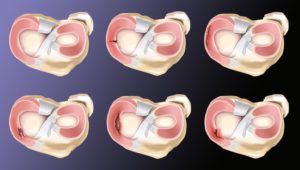
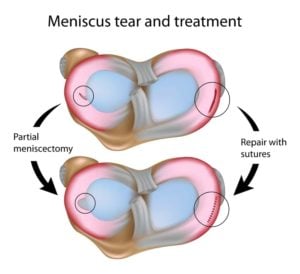



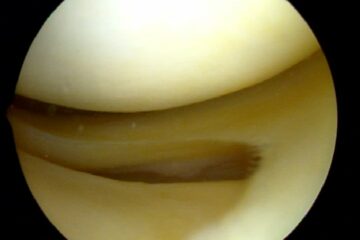

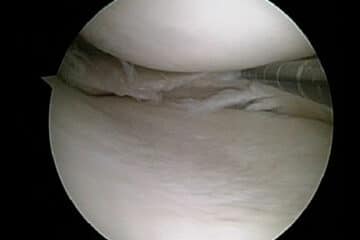





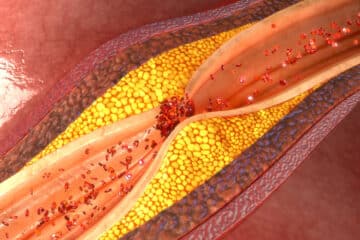
Dear Dr Luks
I am 74 years old and have run more than 100 marathons including ultra marathons . Two years ago I developed pain on the inner right knee with slight swelling. I visited my chiropractor for treatment and the swelling and pain disappeared. I can cycle, walk and climb hills without any problem but when I try and run my knee starts hurting again . I visited my orthopedic surgeon who took x-rays and informed me that my condition was genetic related and that the femur and tibia were almost bone on bone, that is why I am experiencing pain when I run. Am I right in concluding that the meniscus on the inner knee has degenerated. I experience no pain when cycling, walking or climbing stairs . Will a compression sleeve and continuous physiotherapy enable me to run again .
Sincerely Lawrence
I’m jealous Lawrence. THat’s quite an impressive amount of running. I enjoy running very much. It seems like you have gotten a lot out of those knees. Hopefully your symptoms simmer down, but there’s no telling when/if you will be able to return to running. The meniscus is a non-issue once there is that much arthritis (bone on bone).
Stay active, keep cycling and walking. Good luck to you!
Hi Doctor Luks,
I am 56 years of age and work on a vineyard in Mildura, Australia . Six years ago I was standing on the back of a flat trailer behind a tractor doing work on poles. I stood off the back of the trailer as it was moving slowly but misjudged the distance to the ground. When my foot hit the ground it felt like my knee hyperextended and I fell to the ground in pain. I couldn’t walk on it properly and I went to outpatients that night. I was told that I had probably damaged my lateral miniscus. I used a walking stick for a bit and tried not to put too much pressure on it but didn’t feel strength in it for over 12 months. I have twinges of pain off an over the years but for the last 3 months, pain has been continual when I walk. I have had no MRI done and wondering whether I should pursue treatment?
Thank you,
Barry
HI Barry… After over a year of dealing with this, it might be nice to see someone and get an idea of what’s going on inside the knee.
Good Luck
I have had swollen knee for 6 weeks.
It was drained twice and blood was present both times.
MRI reports: linear tear of the posterior horn/body of lateral meniscus abutting the inferior articular surface.
Concomitant component of subtle radial tear of the junction of the anterior horn and body of lateral meniscus is also felt present.
Doctor is not sure where bleeding is coming from and recommends surgery to take off part of meniscus.
I am going to get a second opinion.
I have limited range but don’t have any pain.
Will surgery cause future problems?
HI Michael …
Bleeding in the knee is usually due to a tear in the lateral meniscus near an area we call the popliteal hiatus. It is not common, but I have seen many cases in my career. Without seeing you I cannot comment on whether or not surgery is the right answer.
Good luck
Hi Dr. Luis,
Greetings form Colombia. Am an 18 year old boy. Last Monday I was playing basketball and a kid fell in my knee. The MRI results came saying I have a partial radial tear in my lateral meniscus. I want to know if I need surgery and how much more would the recovery take? I want to come back an play basketball.
Thanks,
Julián
Greetings from NY Julian.
Many of these tears will not require surgery. The recovery without surgery can take up to two months for the swelling to subside and for the strength and flexibility to return to normal. Surgery can take a long time to recover from if they repair your tear with stitches.
The link is missing in this sentence at the end of your article. “This paper shows that we are now capable of fixing radial tears of the meniscus, again with a reasonable chance of healing.” Can you provide the link to the paper?
Thanks,
Chris
Done … the link should be live.